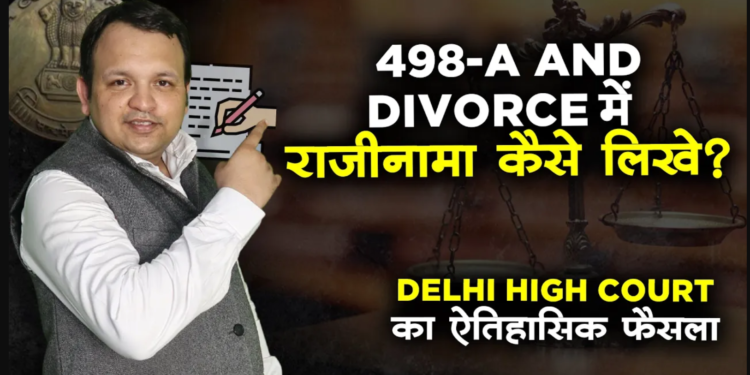Introduction:
During heated arguments, it’s not uncommon for spouses to contemplate divorce, leveling various accusations against each other. However, once the anger subsides, the parties may seek reconciliation and avoid divorce proceedings. In such cases, a settlement or mediation agreement often comes into play. But how do you navigate such situations, and how can you draft a settlement agreement to prevent future issues?
This was discussed in the landmark judgment of the Delhi High Court,
Sh. Chhatter Pal & Ors vs. State & Anr, on 16th May 2023.
Read till the end of the blog to explore the topic.
If any questions still persist, feel free to contact us;
Here are 10 essential points to remember, as discussed in the landmark judgment;
- Name of Parties:
Ensure that the full names, Aadhar card numbers, father or husband’s names, ages of the individuals, and residence information are correctly stated.
2. Avoid Confusing Terms:
Instead of using legal terms like respondent and petitioner, use the full names of the parties for clarity.
3. Include All Details:
Don’t assume the agreement will be too long; add all minute details to help in case of future disputes.
4. Timeline:
Mention dates to avoid ambiguity. Specify how long the conditions will be fulfilled, or, for example, how long a certain payment will be made.
5. Add Default Clause:
Include a default clause that outlines the actions to be taken if the agreed-upon conditions are not met. It’s advisable to set a deadline to increase the validity of the agreement.
6. Mode of Payment:
If any amount is to be paid as alimony, provide precise bank details or the chosen mode of payment, along with the amount.
7. Mention of Potential Parties:
Include the names of any individuals who may be involved, such as family members, to prevent future disputes or potential FIRs.
8. Cross Cases:
Clearly specify the withdrawal of any pending cases, including the court where the case is pending and court dates, to avoid confusion.
9. Read and Understood Clause:
Include a clause stating that the agreement has been read and understood, ensuring that the parties cannot claim later that they signed without comprehension.
10. Signing of Agreement:
When signing on behalf of the family, explicitly state that you are doing so to prevent future family-related issues.
Conclusion,
THe Delhi High Court has taken significant steps to streamline the process of drafting settlement agreements in matrimonial cases. By insisting on clarity in language and the avoidance of ambiguous terms, the court aims to reduce the potential for further litigation and disputes. The court’s emphasis on specifying timelines and incorporating default clauses underscores the importance of precise and well-thought-out agreements.
Recognizing the highly stressful nature of matrimonial disputes and divorces, the court highlights the pivotal role that early settlements can play in alleviating the emotional and financial burdens on both parties. The court’s guidance serves as a reminder that the careful fulfillment of each condition in such agreements can have far-reaching implications, affecting the lives of those involved. Ultimately, these guidelines aim to promote efficient and fair resolutions in matrimonial cases.
For understanding more such complex law in simple ways, stay connected with www.thelegalshots.com .
If doubts still persist, contact our Legal Experts at




